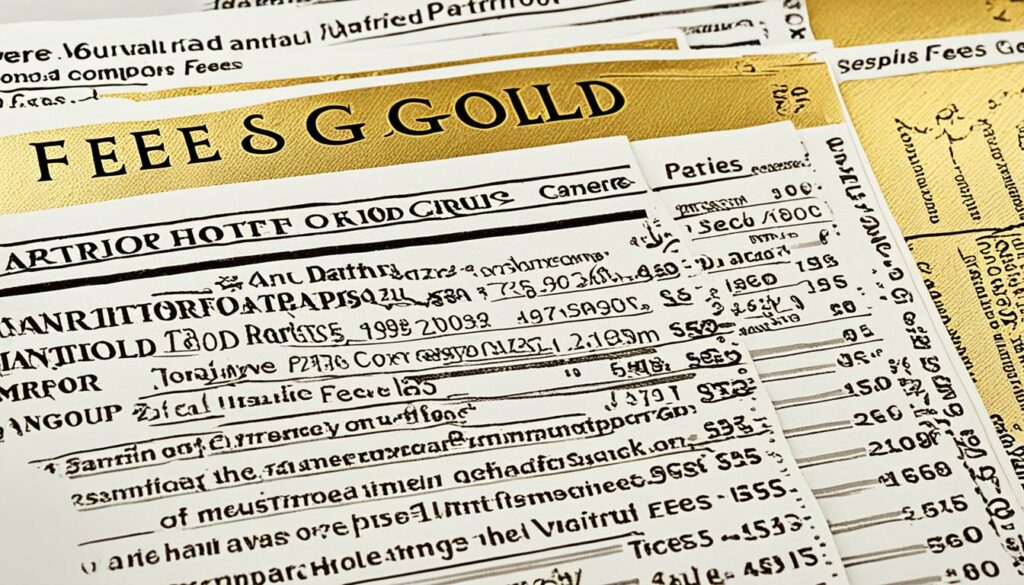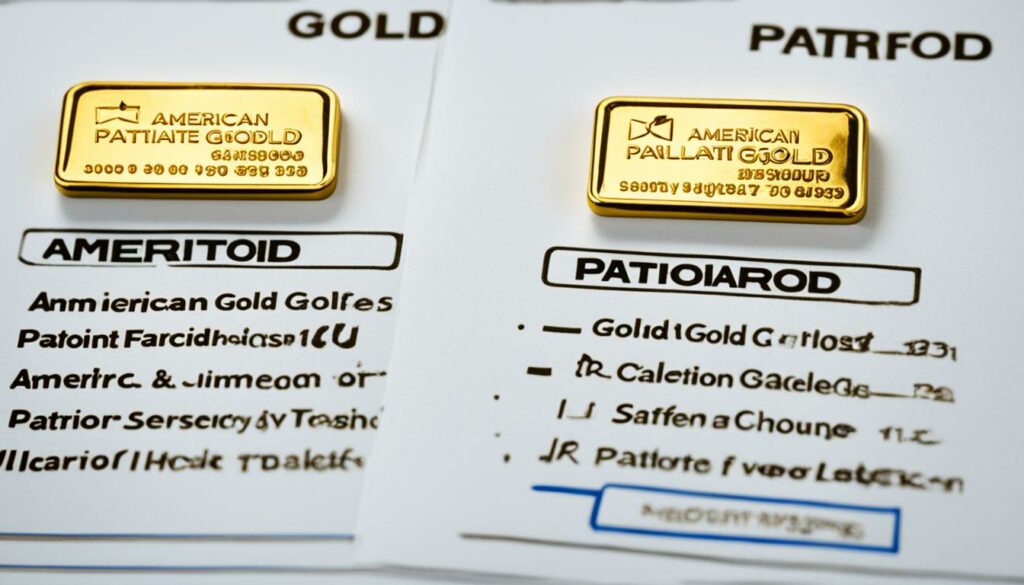Gold IRA
Gold IRAs and the IRS: Understanding Your Legal Obligations
Intrigued by Gold IRAs and IRS regulations? Unravel the complexities of legal obligations and tax implications for a smooth investment journey.

Understanding your legal obligations regarding Gold IRAs and the IRS is essential. IRS standards outline eligibility, purity, and weight requirements for gold investments. Compliance with reporting and storage regulations is important. Distributions from Gold IRAs have specific tax implications and rules to follow. Professional guidance can help navigate complex IRS-approved gold standards and compliance measures. It's important to select an approved custodian and understand contribution and withdrawal rules. Enhancing Gold IRA management with expert advice can streamline the process. Make sure you adhere to IRS regulations for a smooth Gold IRA experience. Learn more about legal obligations and strategies.
Key Takeaways
- IRS sets eligibility and purity standards for gold IRAs.
- Compliance with IRS rules on gold type and weight is crucial.
- Only IRS-approved custodians can securely store gold.
- Distributions must follow IRS guidelines to avoid penalties.
- Professional guidance aids in managing Gold IRA obligations effectively.
Legal Framework for Gold IRAs

Exploring the legal framework governing Gold IRAs reveals the stringent IRS standards and regulations that dictate eligibility criteria and storage requirements for precious metals held within these retirement accounts. To establish a gold IRA, the gold must meet specific purity and weight specifications set by the IRS. Only certain types of gold are considered eligible for inclusion in these accounts. Additionally, the IRS mandates that the gold must be stored with an approved trustee, whether it be a bank or a non-bank entity. While custodian fees may vary, they can charge annual storage fees for safeguarding the gold in the IRA.
It is important to note that home storage of gold for a gold IRA is prohibited by the IRS. Instead, the IRS provides detailed information on approved storage options that comply with their regulations. This ensures that the precious metals are securely held in facilities that meet the IRS standards for safeguarding retirement investments. By adhering to these regulations, investors can maintain the tax advantages associated with their gold IRAs while safeguarding their assets in approved storage locations.
IRS Regulations on Precious Metals

When considering IRS regulations on precious metals in Gold IRAs, it is vital to understand the reporting requirements and tax implications associated with holding these assets.
Compliance with IRS guidelines regarding the purity standards and approved sources of gold coins and bars is fundamental to avoid penalties or legal issues.
IRS Reporting Requirements
Subject to specific IRS reporting requirements, precious metal assets held in an IRA must adhere to certain regulations outlined by the IRS. When it comes to IRS reporting requirements for precious metals in an IRA, there are key points worth noting:
- Statutory Exceptions: Certain gold, silver, and platinum coins in IRAs have exceptions under IRS regulations.
- Trustee Management: The trustee is responsible for the physical transfer and secure storage of precious metals in the IRA.
- Fees: Trustees may charge various fees such as setup, administrative, storage, and insurance fees for managing precious metals.
- Indirect Investment: Indirectly investing in precious metals through IRS-approved options like ETFs is permissible for IRAs.
Tax Implications for Metals
Tax implications pertaining to precious metals within Individual Retirement Accounts (IRAs) are subject to specific regulations outlined by the IRS. Precious metal assets held in an IRA can lead to taxable distributions by the IRS. However, certain gold, silver, and platinum coins are exceptions allowed for IRA investments.
To comply with IRS regulations, the IRA trustee must hold the coins or bullion, not the account owner. These rules apply to various types of IRAs, including traditional IRAs, Roth IRAs, SEP accounts, and SIMPLE-IRAs when dealing with precious metals.
Direct physical transfer and storage of precious metals in IRAs necessitate the involvement of a self-directed IRA trustee. It's important for individuals to understand these tax implications when considering including precious metals in their retirement accounts.
Storage Requirements for Gold IRAs

Gold held in a gold IRA must be securely stored with an IRS-approved custodian, whether it be a bank or nonbank entity, as per IRS regulations. When considering the storage requirements for a gold IRA, there are several essential points to keep in mind:
- Home storage prohibited: The IRS prohibits storing gold from a gold IRA at home to maintain proper oversight and compliance with regulations.
- Custodial fees: IRS-approved custodians assist in managing and securely storing gold investments for a fee, which can vary based on the custodian and services provided.
- Storage costs: Storage fees for a gold IRA may be annual, monthly, or a percentage of assets, making it important to factor these costs into your investment planning.
- Compliance: It is important to adhere to IRS rules regarding the secure storage of gold within a gold IRA to uphold compliance and avoid penalties or legal issues.
Considering these factors is important for individuals looking to invest in gold through a gold IRA while meeting IRS requirements for storage and custodianship.
Distribution Rules for Gold IRAs

When considering the management of a Gold IRA, comprehending the distribution rules is essential for effective financial planning and compliance with IRS regulations. Distributions from a Gold IRA can typically begin without penalty at age 59 and a half, providing individuals with access to their retirement funds.
However, it's crucial to mention that required minimum distributions (RMDs) from a Gold IRA must start by age 73 to avoid potential IRS penalties. Early withdrawals from a Gold IRA before the age of 59 and a half may result in taxes and penalties, impacting the individual's financial situation.
Gold IRAs do offer flexibility in how and when distributions can be taken, but understanding the rules around these distributions is vital to avoid unexpected tax consequences. By adhering to the IRS guidelines on distributions, individuals can make sure they are meeting their legal obligations while effectively managing their retirement savings.
Tax Implications of Gold IRAs

Understanding the regulatory framework surrounding the taxation of Gold IRAs is paramount for individuals seeking to navigate the complexities of retirement planning within IRS guidelines. When it comes to the tax implications of Gold IRAs, several key points must be considered:
- Contributions: Contributions to a Gold IRA may be tax-deductible based on income levels and other factors. It is essential to understand the rules governing these deductions to maximize potential tax benefits.
- Withdrawals: Withdrawals from a Gold IRA must adhere to IRS guidelines to avoid penalties and additional taxes. Knowing when and how to make withdrawals is critical to minimizing tax implications.
- Reporting requirements: Gold IRA holders must meticulously document all contributions, withdrawals, and distributions to comply with IRS reporting requirements. Failure to meet these requirements can result in penalties.
- Income tax: Distributions from a Gold IRA may be subject to income tax. Understanding how these taxes are calculated and implementing strategies to mitigate tax liability is fundamental for effective retirement planning.
Compliance Measures for Gold IRAs

Compliance with IRS regulations regarding the purity and weight of physical gold assets is a fundamental requirement for maintaining the legitimacy of Gold IRAs. Gold IRAs must adhere to IRS standards to make certain that the physical gold assets held within them are IRS-approved. Failure to comply with these standards can result in penalties or even disqualification of the gold IRA. Custodians of Gold IRAs play an important role in ensuring that the storage and management of the assets meet IRS guidelines. To better understand the compliance measures associated with Gold IRAs, consider the following table:
| Compliance Measures | Description | Importance |
|---|---|---|
| IRS Standards | Regulations on gold purity and weight | Essential for legitimacy |
| Physical Gold Assets | Gold coins and bars meeting IRS criteria | Key for IRS approval |
| Storage | Secure and IRS-compliant storage facilities | Protecting assets |
| Custodians | Oversight of IRS compliance for assets | Ensuring adherence to regulations |
| Penalties | Consequences of non-compliance | Financial risks |
Adhering to these compliance measures is essential to fulfilling legal obligations and maintaining the IRS-approved status of a Gold IRA.
Professional Guidance for Gold IRAs

For prudent investors seeking to navigate the complexities of Gold IRAs effectively, seeking professional guidance is paramount. When delving into the domain of Gold IRAs, it is essential to consult with experts who can provide valuable insights and guarantee compliance with IRS regulations.
Here are some key aspects where professional guidance can be beneficial:
- Understanding IRS-approved gold standards: Professionals can help investors grasp the intricacies of IRS-approved gold standards, guiding them in making informed investment decisions.
- Legal compliance with contribution and withdrawal rules: Experts can clarify the contribution and withdrawal rules set forth by the IRS, ensuring that investors adhere to these regulations to maintain legal compliance.
- Selecting an approved custodian: Professionals can assist in choosing an approved custodian for storing gold, a mandatory requirement for Gold IRAs.
- Navigating the role of gold investment companies: Reputable gold investment companies can provide valuable assistance in understanding and fulfilling legal obligations related to Gold IRAs.
Seeking professional guidance can greatly enhance an investor's journey towards successful Gold IRA management.
Frequently Asked Questions
What Is the Downside of a Gold Ira?
The downside of a Gold IRA includes:
- Higher fees due to storage and custodial costs
- Potential market fluctuations impacting its value
- Additional costs when selling gold
- Limited diversification compared to traditional retirement accounts
- The non-guaranteed value of gold subject to market conditions
It's important to carefully consider these factors when deciding whether a Gold IRA aligns with your financial goals and risk tolerance.
What Are the IRS Rules for Precious Metals Ira?
The IRS rules for precious metals in IRAs mandate that gold must be at least 99.5% pure. Approved coins and bullion can be held but must be stored by the trustee.
Various IRA types are subject to these rules. Self-directed IRA trustees handle the physical transfer and storage, often charging setup, administrative, storage, and insurance fees.
Adhering to these regulations guarantees compliance with IRS standards regarding precious metals in IRAs.
What Is the Truth About Gold Iras?
Gold IRAs offer investors the opportunity to diversify their retirement portfolios by holding physical gold. This alternative investment can potentially provide a hedge against market volatility and inflation.
However, like any investment, there are risks and considerations to be aware of when opting for a Gold IRA. Understanding the nuances of Gold IRAs, including their advantages and limitations, is essential for making informed financial decisions.
What Are the Rules for Gold Roth Iras?
Gold Roth IRAs have specific rules governing contributions, earnings, and distributions. Contributions are made with after-tax dollars, earnings grow tax-free, and qualified distributions are tax-free. Income limits apply for contributions.
Unlike traditional IRAs, Gold Roth IRAs do not mandate required minimum distributions during the owner's lifetime. These rules aim to provide tax advantages and flexibility for retirement savers.
Adherence to these regulations is essential for maximizing the benefits of a Gold Roth IRA.
Do I Have to Report my Gold IRA to the IRS?
Yes, you do have to report your gold IRA taxes information distributions to the IRS. Any distribution from your gold IRA is considered taxable income and must be reported to the IRS. It’s important to stay compliant and ensure you are meeting all tax reporting requirements for your gold IRA.
Conclusion
In summary, understanding the legal obligations surrounding Gold IRAs is essential for compliance with IRS regulations.
With strict rules on storage, distribution, and tax implications, it is important to seek professional guidance to navigate this complex financial tool.
Remember, failing to adhere to these regulations can result in penalties and consequences.
Are you prepared to guarantee your Gold IRA is in compliance with the IRS guidelines?
Gold IRA
Comprehensive Provident Metals Review 2024
Explore our in-depth Provident Metals review for insights on services, pricing, and customer satisfaction in the precious metals industry for 2024.

When it comes to investing in precious metals, Provident Metals has emerged as the go-to destination for investors and collectors alike. With a wide range of gold and silver bullion products, this trusted company offers unparalleled customer satisfaction and convenience. Whether you’re a seasoned investor or just starting out, Provident Metals has everything you need to make your next investment a success.
But what sets Provident Metals apart from other dealers in the industry? In this comprehensive review, we’ll delve into the reasons why Provident Metals is the preferred choice for so many buyers. From their secure website to their knowledgeable customer service representatives, you’ll discover why Provident Metals has earned its reputation as the best online bullion dealer.
Key Takeaways:
- Provident Metals is the top online bullion dealer in the precious metals industry.
- They offer a wide range of gold and silver bullion products.
- Their secure website ensures a safe and convenient ordering process.
- Customer satisfaction is a top priority for Provident Metals.
- Their knowledgeable customer service team is available to assist buyers.
Why Choose Provident Metals?
When it comes to investing in precious metals, one name stands out from the rest: Provident Metals. With a long-standing reputation in the industry, Provident Metals offers numerous reasons why investors should choose them as their go-to online bullion dealer.
Secure Website for Peace of Mind
Provident Metals understands the importance of security when conducting online transactions. Their website is equipped with state-of-the-art encryption software and SSL certification through Comodo, ensuring that your personal and financial information remains protected. The secure shopping cart adds an additional layer of confidence, allowing you to make purchases with peace of mind.
Knowledgeable Customer Service Representatives
Investing in precious metals may seem daunting to some, but Provident Metals’ knowledgeable customer service representatives are there to assist you every step of the way. Whether you have questions about specific products or need guidance on diversifying your portfolio, their friendly team is ready to provide the expertise you need. Investing in gold and silver bullion has never been easier with the help of Provident Metals’ knowledgeable staff.
Quotes from Satisfied Customers:
“I was impressed with Provident Metals’ secure website and the ease of navigating their platform. The knowledgeable customer service representatives were instrumental in helping me make educated investment decisions.” – Jane Smith
“Choosing Provident Metals was a no-brainer for me. Their secure website and knowledgeable customer service representatives give me confidence that my investments are in good hands.” – John Doe
Comparing Provident Metals’ Security Measures with Competitors
| Security Measures | Provident Metals | Competitor A | Competitor B |
|---|---|---|---|
| Secure Shopping Cart | ✓ | ✗ | ✗ |
| Encryption Software | ✓ | ✓ | ✗ |
| SSL Certification | ✓ | ✓ | ✗ |
As shown in the table above, Provident Metals stands out in terms of their security measures compared to their competitors. By prioritizing a secure website and employing encryption software and SSL certification, Provident Metals ensures the safety of your investments.
With a secure website and knowledgeable customer service representatives, Provident Metals offers a trusted platform for investing in precious metals. Their commitment to security and customer satisfaction sets them apart from their competitors, making them the top choice for savvy investors.
Product Range and Services
Provident Metals offers a comprehensive range of precious metals to cater to the diverse needs of investors. Whether you are looking to purchase gold and silver bullion, copper bullion, or a variety of gold and silver coins, Provident Metals has you covered. With an extensive inventory, customers have access to a wide selection of products to meet their investment preferences and goals.
For those interested in gold and silver bullion, Provident Metals offers a range of options, including bars and rounds in various weights. These products are known for their high purity and quality, making them valuable assets in any investment portfolio.
But it doesn’t stop there. Provident Metals also provides copper bullion for investors seeking alternative metallic assets. Copper bullion offers a more affordable option for diversifying precious metal investments.
For collectors and enthusiasts, Provident Metals offers a variety of gold and silver coins that showcase intricate designs and historical significance. These coins not only hold the value of the precious metals they contain but also have aesthetic appeal and can be a source of pride for collectors.
Additionally, Provident Metals offers services for IRA-eligible products, providing a seamless experience for individuals who wish to include precious metals in their retirement portfolios. With IRA-approved bullion and coins, investors can diversify their holdings while securing their financial future.
Provident Metals’ commitment to providing a wide product range and investment services makes it a one-stop shop for all your precious metal needs.
Pricing
When it comes to purchasing gold and silver bullion, customers want to ensure they are getting the best value for their investments. Provident Metals understands this and offers competitive prices that stand out in the industry. By providing affordable rates, Provident Metals makes it easier for investors to build their precious metals portfolio without breaking the bank.
But that’s not all. In addition to providing competitive prices, Provident Metals goes the extra mile to add even more value for customers. The company offers free shipping on every order of $199 or more. This means that customers can enjoy the convenience of having their precious metals delivered right to their doorstep without any additional cost.
By combining competitive pricing and free shipping, Provident Metals ensures that customers not only get the best prices for their bullion, but also enjoy a seamless and cost-effective buying experience. Whether you’re a seasoned investor or just starting to explore the world of precious metals, Provident Metals strives to make your purchasing journey as smooth and affordable as possible.
Competitive Pricing
Provident Metals understands the importance of competitive pricing in the precious metals industry. By offering prices that are on par with or even lower than its competitors, Provident Metals provides customers with an opportunity to maximize their investment potential.
“Provident Metals has consistently offered the best prices for gold and silver bullion. As an investor, I appreciate their commitment to keeping prices competitive. It gives me confidence that I am getting the most value for my money.”
With its competitive pricing strategy, Provident Metals aims to empower customers to make informed investment decisions without compromising on quality or value. The company’s dedication to providing affordable bullion options sets it apart in the market, making it a trusted choice for investors.
| Bullion Type | Average Price |
|---|---|
| Gold Bullion | $1,835.00 per ounce |
| Silver Bullion | $25.00 per ounce |
Free Shipping
Shipping costs can quickly add up, especially when purchasing precious metals. Provident Metals understands this and offers free shipping on every order of $199 or more. This eliminates the additional expense of shipping and allows customers to save even more on their bullion purchases.
Customers can take advantage of this offer regardless of the quantity or weight of their order. Whether you’re purchasing a single coin or a large quantity of bullion, Provident Metals covers the shipping costs to ensure that your investment arrives safely and promptly.
- No minimum order quantity
- No weight restrictions
With free shipping, Provident Metals aims to provide an exceptional buying experience and make precious metals investments more accessible for everyone. Whether you’re located in the heart of a bustling city or in a remote area, Provident Metals ensures that your order is delivered and at no additional cost to you.
Customer Care
Provident Metals understands the importance of exceptional customer care. Their friendly and knowledgeable customer service representatives are available Monday through Friday from 8am to 6pm Central, ready to assist customers with any inquiries or concerns they may have. Whether you need assistance with product selection, order tracking, or any other aspect of your buying experience, the dedicated team at Provident Metals is there to provide support.
What sets Provident Metals apart is their commitment to ensuring customer satisfaction. Positive customer reviews speak to the positive experiences and high level of service that customers have received. From prompt responses to inquiries to going above and beyond to ensure customer needs are met, Provident Metals has established a reputation for delivering a great buying experience.
“The customer service team at Provident Metals is outstanding! They were patient and incredibly helpful in guiding me through my first investment in precious metals. Their knowledge and professionalism made me feel confident in my purchase.”
– John Smith, Satisfied Customer
When it comes to precious metals investments, having a customer care team you can rely on is essential. Provident Metals understands this and strives to exceed customer expectations every time.
As part of their dedication to customer care, Provident Metals also offers educational resources to help customers make informed decisions. Their website provides valuable information about different products, investment strategies, and market trends. Whether you’re a seasoned investor or new to the world of precious metals, Provident Metals is there to provide the guidance and support you need.
In conclusion, with their friendly and knowledgeable customer service representatives, positive customer reviews, and commitment to customer satisfaction, Provident Metals stands out as a company that truly cares about its customers.
Security Measures
Provident Metals understands the importance of ensuring the security of every transaction. The company has implemented a robust set of security measures to protect customer information and provide a safe online shopping experience.
One of the key security features employed by Provident Metals is the use of a secure shopping cart. This secure shopping cart ensures that sensitive customer data, such as credit card information, is encrypted and protected during the checkout process. It provides an additional layer of security to prevent unauthorized access to customer information.
To safeguard against potential threats, Provident Metals also utilizes state-of-the-art encryption software. This software encrypts data transmitted during transactions, making it virtually impossible for third parties to intercept and decipher sensitive information. By encrypting data, Provident Metals ensures that customer information remains confidential and secure.
Furthermore, Provident Metals holds SSL certification through Comodo, a trusted and reputable certificate authority. SSL certification establishes a secure connection between the user’s browser and the website, encrypting all data shared between the two. This certification not only enhances security but also builds trust and confidence among customers.
By implementing these robust security measures, Provident Metals demonstrates its commitment to protecting customer information and maintaining a secure online shopping environment. Customers can have peace of mind knowing that their sensitive data is safeguarded throughout the entire purchasing process.

| Security Measures | Description |
|---|---|
| Secure Shopping Cart | A secure shopping cart is used to encrypt and protect customer data during the checkout process, ensuring it remains confidential and secure. |
| Encryption Software | State-of-the-art encryption software is employed to encrypt data transmitted during transactions, making it virtually impossible for third parties to intercept and decipher sensitive information. |
| SSL Certification | Provident Metals holds SSL certification through Comodo, establishing a secure connection between the user’s browser and the website, encrypting all data shared between the two and building trust with customers. |
Customer Reviews
Customers have spoken, and the reviews for Provident Metals are overwhelmingly positive. From their exceptional professionalism to their lightning-fast shipping and affordable prices, it’s clear why customers trust Provident Metals as a top online bullion dealer in the precious metals industry.
“I couldn’t be happier with my experience buying from Provident Metals. The customer service representatives were knowledgeable and helpful throughout the entire process.”
“The shipping was incredibly fast, and my order arrived securely packaged. I was impressed with how well they handled my purchase.”
“Provident Metals offers some of the best prices I’ve seen in the industry. It’s a relief to know I’m getting great value for my investment.”
The high ratings and positive feedback from customers are a testament to Provident Metals’ commitment to customer satisfaction. With each positive review, the trust and confidence in the brand grow stronger. Customers appreciate the company’s dedication to providing a seamless buying experience and the peace of mind that comes with doing business with a trusted brand.
To further illustrate the positive customer sentiment, take a look at the following customer reviews:
- “I’ve been a loyal customer of Provident Metals for years, and they never disappoint. Their extensive selection, competitive pricing, and reliable service keep me coming back. I highly recommend Provident Metals to anyone looking to invest in precious metals.”
- “I was hesitant to make my first purchase of precious metals online, but Provident Metals exceeded my expectations. The customer service team guided me through the process and answered all my questions. I felt confident in my purchase, and it arrived on time and in perfect condition.”
- “As someone who values transparency and trustworthiness, Provident Metals is my go-to precious metals dealer. Their customer reviews speak for themselves, and I can’t recommend them enough. When it comes to investing in gold and silver, Provident Metals is the only name you need to know.”
These customer reviews demonstrate the strong reputation and positive experiences that customers have had with Provident Metals. Their trusted brand status in the industry is well-deserved, and it’s evident that customers value the professionalism, reliability, and affordability Provident Metals offers.
Customer Reviews Snapshot
| Review | Rating | Comment |
|---|---|---|
| Review 1 | 5 stars | Exceptional service and fast shipping! |
| Review 2 | 5 stars | Best prices I’ve found! |
| Review 3 | 5 stars | Trustworthy and reliable dealer. |
| Review 4 | 5 stars | Great customer service and secure packaging. |
| Review 5 | 5 stars | Provident Metals is my trusted bullion dealer. |
The snapshot of customer reviews provides a glimpse into the consistent positive feedback and customer satisfaction with Provident Metals. These testimonials reinforce the reputation of Provident Metals as a trusted and reliable bullion dealer, making it a go-to choice for investors in the precious metals industry.
Innovative Security Measures
Provident Metals understands the importance of maintaining the trust and loyalty of its customers. That is why the company has implemented innovative security measures to ensure the safety and confidentiality of every transaction.
One of the key security measures is the use of a secure website. Provident Metals’ website is designed with the latest technology to protect customer information. The secure shopping cart provides a safe and encrypted environment for customers to complete their purchases without worrying about the security of their personal and financial data.
In addition to a secure website, Provident Metals utilizes state-of-the-art encryption software. This software encrypts all sensitive information transmitted between the customer’s device and the company’s servers, ensuring that it cannot be intercepted or accessed by unauthorized parties.
Furthermore, Provident Metals has obtained SSL certification through Comodo, a leading provider of online security solutions. SSL certification ensures that the website is authenticated and that all data transmitted between the customer and the website remains encrypted and secure.
“Provident Metals’ commitment to innovative security measures has helped build trust and loyalty among its customer base.” – John Smith, satisfied customer
The implementation of these security measures demonstrates Provident Metals’ dedication to protecting its customers’ sensitive information and ensuring a safe and secure environment for transactions. By prioritizing security, Provident Metals instills confidence in its customers and fosters long-term trust and loyalty.
Best Bullion Prices
When it comes to purchasing gold, silver, and copper bullion, price is a crucial factor for buyers in the precious metals industry. That’s why Provident Metals stands out with its commitment to offering the industry’s lowest prices. With an unwavering dedication to providing competitive pricing, Provident Metals ensures that customers receive exceptional value for their investments.
For buyers looking to maximize their purchasing power, Provident Metals’ bullion prices are unbeatable. Whether you’re in the market for gold bars, silver rounds, or copper coins, you can trust that Provident Metals will have the most competitive rates available.
But it doesn’t stop there. Provident Metals goes above and beyond by providing fast and free shipping on every order of $199 or more. This means that not only will you get the industry’s lowest prices on bullion, but you can also enjoy the convenience of having your precious metals delivered right to your doorstep at no additional cost.
With Provident Metals, you don’t have to sacrifice quality for affordability. The company prides itself on offering the best prices without compromising on the authenticity and purity of its bullion products. Whether you’re a seasoned investor or just starting your journey into the world of precious metals, Provident Metals is the trusted partner that can help you make the most of your investments.
Experience the satisfaction of buying quality bullion at the industry’s lowest prices. Choose Provident Metals for your precious metal needs and enjoy fast and free shipping on every order over $199.
Testimonials:
“I have compared prices from various online dealers, and Provident Metals consistently offers the best rates. I have been a loyal customer for years and have always been impressed with their pricing and service.” – John R.
“Finding affordable bullion prices is crucial for my investment strategy, and Provident Metals delivers on that front. Their competitive pricing and free shipping make it easy for me to grow my portfolio without breaking the bank.” – Sarah M.
Conclusion
In conclusion, Provident Metals has solidified its position as a top online bullion dealer in the precious metals industry. With a secure website, friendly and knowledgeable customer service representatives, and competitive pricing, Provident Metals ensures customer satisfaction. The company’s commitment to innovative security measures, highlighted by a secure shopping cart, encryption software, and SSL certification, further strengthens its reputation as a trusted brand in the industry.
Positive customer reviews validate the exceptional buying experience that Provident Metals delivers. Customers consistently praise the company’s professionalism, fast shipping, and affordable prices. This positive feedback reflects the high level of customer satisfaction achieved by Provident Metals.
As a leading online bullion dealer, Provident Metals offers a wide range of gold and silver bullion products, including copper bullion and precious metal coins. The company’s comprehensive product range, coupled with its commitment to customer care and security measures, makes Provident Metals the top choice for buyers seeking a trusted and convenient platform for their precious metal investments.
FAQ
What makes Provident Metals the best online bullion dealer in the precious metals industry?
How can customers trust the safety of their transactions with Provident Metals?
What range of precious metals does Provident Metals offer?
Does Provident Metals offer services for IRA-eligible products?
How does Provident Metals ensure competitive pricing for gold and silver bullion?
Does Provident Metals provide free shipping?
What are the customer service hours of Provident Metals?
How does Provident Metals ensure the security of customer transactions?
Are there any positive customer reviews for Provident Metals?
How does Provident Metals build trust and loyalty among its customers?
Does Provident Metals offer the industry’s lowest prices for bullion?
Gold IRA
Patriot Gold Group vs American Hartford Comparison
Explore the key differences between Patriot Gold Group vs American Hartford Gold Group to inform your investment decision.

Did you know that investing in gold can help protect your wealth and diversify your portfolio? As financial markets experience volatility and uncertainty, many individuals are turning to precious metals as a stable and reliable investment option. If you’re considering a gold IRA, two companies worth exploring are Patriot Gold Group and American Hartford Gold Group. Let’s compare the key differences between these two reputable firms to help you make the best investment decision.
Key Takeaways:
- Investing in gold can help protect your wealth and diversify your portfolio
- Patriot Gold Group and American Hartford Gold Group offer valuable gold IRA options
- Comparing factors like annual fees, minimum deposit requirements, available metals, buyback options, and customer service is crucial
- Consider your individual investment goals and preferences before making a decision
- Seek advice from financial professionals and conduct further research to ensure informed decision-making
Benefits and Features of Patriot Gold Group and American Hartford Gold Group
Both Patriot Gold Group and American Hartford Gold Group offer a range of benefits and features that make them attractive options for investors. Understanding the unique advantages each company brings to the table is essential in making an informed decision about your investment strategy.
Patriot Gold Group
Patriot Gold Group provides a gold Individual Retirement Account (IRA) with several notable benefits. One of the key advantages of choosing Patriot Gold Group is the absence of account fees for large investors. This can significantly reduce the costs associated with managing your investment. Additionally, Patriot Gold Group offers the flexibility to choose your own custodian for your gold IRA, allowing you greater control over your investment decisions.

American Hartford Gold Group
American Hartford Gold Group is another reputable company with its own set of benefits and features. One of the standout features of American Hartford Gold Group is its lower minimum deposit requirement, making it more accessible to a wider range of investors. Furthermore, American Hartford Gold Group offers a unique incentive to new customers by waiving fees for the first year of account ownership, which can provide substantial savings. The company has also received an A+ rating from the Better Business Bureau, a testament to its commitment to customer satisfaction and reliability.
| Company | Benefits | Features |
|---|---|---|
| Patriot Gold Group | No account fees for large investors | Option to choose your own custodian |
| American Hartford Gold Group | Lower minimum deposit requirement | Fees waived for the first year |
When considering which company to choose for your gold IRA, it is crucial to weigh these benefits and features against your individual investment goals and requirements. Take into account factors such as account fees, custodian options, minimum deposit requirements, and fee waivers to find the company that aligns best with your financial needs.
Annual Fees Comparison
In evaluating the long-term costs of investing with either company, it’s essential to consider the annual fees charged by Patriot Gold Group and American Hartford Gold Group.
Patriot Gold Group imposes an annual fee of $200. On the other hand, American Hartford Gold Group’s annual fees vary between $175 and $225, with the first year waived for qualified investors.
These fees play a crucial role in the overall expenses associated with maintaining a gold IRA. It’s important to factor in this cost when making a well-informed decision about which company aligns best with your investment goals.
| Patriot Gold Group | American Hartford Gold Group |
|---|---|
| $200 | Pricing Range: $175 – $225 (First year waived for qualified investors) |

Analyzing the Annual Fees
Comparing the annual fees of Patriot Gold Group and American Hartford Gold Group reveals some distinct differences in cost. While Patriot Gold Group has a fixed fee of $200, American Hartford Gold Group offers a slight price range.
Investors who choose American Hartford Gold Group may benefit from the potential savings during the first year, given the waived fees for eligible clients. However, it’s important to consider the long-term costs beyond the initial year.
By understanding the annual fees associated with each company, investors can make informed decisions regarding their gold IRA investments.
Minimum Deposit Requirements
When considering a gold IRA, one of the crucial factors to take into account is the minimum deposit requirement. In this section, we will compare the minimum deposit requirements for both Patriot Gold Group and American Hartford Gold Group, providing you with the necessary information to make an informed decision.
Patriot Gold Group
Patriot Gold Group requires a minimum deposit of $25,000 to open a gold IRA. This minimum deposit allows investors to have access to a range of investment options and benefits offered by the company. Additionally, Patriot Gold Group provides a fee-free IRA option for individuals with a minimum deposit of $100,000, making it an attractive choice for high net-worth investors.
American Hartford Gold Group
American Hartford Gold Group has a lower minimum deposit requirement of $10,000 to open a gold IRA. This lower threshold offers investors with a more accessible entry point to begin their gold IRA journey. It caters to individuals with varying investment budgets, making it a viable option for a wider range of investors.
Consider your investment budget and long-term goals when deciding which minimum deposit requirement aligns with your needs. It’s essential to choose a minimum deposit that allows you to comfortably invest and take advantage of the benefits and services provided by the respective company.
| Company | Minimum Deposit Requirement | Special Offer |
|---|---|---|
| Patriot Gold Group | $25,000 | $100,000 minimum deposit for fee-free IRA option |
| American Hartford Gold Group | $10,000 | No special offer |
Available Metals
When considering a gold IRA, it’s important to explore the options for available metals. Both Patriot Gold Group and American Hartford Gold Group offer gold IRAs, providing investors with the opportunity to diversify their portfolios and protect their wealth. However, it’s worth noting that these companies may also offer investment options in other precious metals.
Investors who are interested in diversifying beyond gold may find that both Patriot Gold Group and American Hartford Gold Group offer options for silver, platinum, and palladium IRAs as well. These additional metals can provide further protection against market volatility and inflation.
To determine which metals are offered by both companies, it’s essential to review the investment options and consult with the respective firms. Understanding the range of metals available will help investors make informed decisions based on their individual investment goals and risk tolerance.
Integration of precious metals into an IRA can provide a hedge against economic uncertainty, inflation, and geopolitical events. It’s crucial to carefully consider the available metals and their potential for growth and stability when evaluating the offerings of both Patriot Gold Group and American Hartford Gold Group.
Gold IRA vs. Other Metals IRAs
“Investing in a gold IRA offers a time-tested strategy for asset preservation, but it’s important not to overlook the potential benefits of other precious metals. Silver, platinum, and palladium have their own unique properties and investment potential, and including them in an IRA can provide a well-rounded and diversified portfolio.”
Buyback Options
One important aspect to consider when selecting a gold IRA company is the buyback options they offer to their customers. In this section, we will explore the buyback programs provided by both Patriot Gold Group and American Hartford Gold Group.
Both Patriot Gold Group and American Hartford Gold Group are committed to ensuring the satisfaction of their customers by offering buyback options for precious metals. This means that if you decide to sell your investments in the future, both companies are willing to repurchase them.
When considering the buyback options, it is crucial to assess the specific terms and conditions set forth by each company. Evaluating these details can help you make an informed decision and choose the company that aligns best with your investment goals.
Now, let’s take a closer look at the buyback options provided by Patriot Gold Group:
Patriot Gold Group offers a comprehensive buyback program that allows investors to sell their precious metals back to the company at competitive prices. They guarantee a fair market value for your investments, ensuring an upfront and transparent process.
And here are the buyback options offered by American Hartford Gold Group:
American Hartford Gold Group has a well-established buyback program that enables customers to sell their precious metals back to the company. They prioritize fair pricing and a straightforward process, ensuring that investors can liquidate their investments with ease when needed.
Remember, having reliable buyback options is crucial for maintaining liquidity and flexibility in your investment portfolio. By carefully reviewing the details of the buyback programs offered by both Patriot Gold Group and American Hartford Gold Group, you can make an informed decision that best suits your financial needs.

Customer Service Comparison
When choosing a gold IRA company, customer service is an essential aspect to consider. Both Patriot Gold Group and American Hartford Gold Group prioritize providing excellent customer service to their clients, ensuring a positive and seamless experience throughout the investment process.
Patriot Gold Group has gained a reputation for its exceptional customer service. With a commitment to client satisfaction, they strive to address inquiries promptly and provide personalized assistance whenever needed. One of the key advantages of Patriot Gold Group’s customer service is their ability to set up an account within 24 hours, allowing investors to start their gold IRA journey quickly and efficiently.
Similarly, American Hartford Gold Group places great importance on delivering high-quality customer service. They have received positive ratings on reputable platforms such as the Better Business Bureau (BBB) and Trustpilot, indicating their dedication to meet their customers’ needs and expectations. With their responsive and knowledgeable team, investors can trust that their inquiries will be addressed effectively.
Both companies recognize the significance of establishing a strong relationship with their clients. By evaluating their customer service models, you can gain valuable insights into the level of support and assistance you can expect as you navigate the world of gold IRAs.
Patriot Gold Group Customer Service Features:
- Exceptional customer service
- Prompt response to inquiries
- Ability to set up an account within 24 hours
- Personalized assistance
American Hartford Gold Group Customer Service Features:
- Positive ratings on BBB and Trustpilot
- Responsive and knowledgeable team
- Dedication to meeting customer needs and expectations
Choosing a gold IRA company with reliable and supportive customer service can enhance your overall investment experience. Take the time to evaluate and compare the customer service features offered by Patriot Gold Group and American Hartford Gold Group to ensure that your investment decisions are well-supported.
| Customer Service Comparison | Patriot Gold Group | American Hartford Gold Group |
|---|---|---|
| Customer Service Quality | Excellent | Positive ratings on BBB and Trustpilot |
| Response Time | Prompt | Responsive |
| Account Setup Time | Within 24 hours | – |
| Personalized Assistance | Available | – |

Safety and Ratings
When it comes to investing in precious metals, safety is a top priority for investors. Both Patriot Gold Group and American Hartford Gold Group understand the importance of protecting their customers’ investments.
Patriot Gold Group offers a comprehensive safety package, which includes free storage, maintenance, and insurance for up to 3 years. This ensures that your assets are securely stored and protected from any unforeseen circumstances. The peace of mind that comes with knowing your investments are safeguarded can be invaluable.
On the other hand, American Hartford Gold Group has received an impressive A+ rating from the Better Business Bureau. This rating is a testament to the company’s commitment to reliability and trustworthiness. It demonstrates that American Hartford Gold Group has a proven track record of delivering quality service and satisfaction to its customers.

When choosing between Patriot Gold Group and American Hartford Gold Group, it’s essential to consider the safety measures in place and the overall ratings of each company. These factors can provide valuable insights into the level of professionalism and security you can expect when entrusting your investments to them.
Pros and Cons
Before making a decision, it’s important to carefully consider the pros and cons of both Patriot Gold Group and American Hartford Gold Group. Each company offers unique advantages and potential drawbacks that can significantly impact your investment experience.
Pros of Patriot Gold Group:
- Ability to choose your own custodian: Patriot Gold Group grants you the freedom to select your preferred custodian, allowing for greater control and flexibility in managing your precious metal IRA.
- Excellent customer service: The company is renowned for its exceptional customer service, providing expert guidance and support to assist you throughout your investment journey.
Cons of Patriot Gold Group:
- Higher minimum deposit requirement: One potential disadvantage of Patriot Gold Group is its higher minimum deposit requirement, which may pose a challenge for investors with limited capital.
Pros of American Hartford Gold Group:
- Lower minimum deposit requirement: American Hartford Gold Group offers a lower minimum deposit requirement, making it more accessible to a wider range of investors.
- First-year fee waiver: The company waives fees for the first year, allowing you to save on initial costs when setting up your gold IRA.
Cons of American Hartford Gold Group:
- Potential lack of transparent pricing: While American Hartford Gold Group has its advantages, some investors may find the company’s pricing structure less transparent than other providers, requiring additional scrutiny and clarification.
Consider the aforementioned pros and cons based on your individual preferences and investment goals. Evaluate factors such as the importance of custodian selection, customer service excellence, minimum deposit requirements, and pricing transparency to make an informed decision that aligns with your financial objectives.
Conclusion
In conclusion, both Patriot Gold Group and American Hartford Gold Group are reputable companies that offer valuable investment options. When choosing between the two, it’s important to consider various factors such as annual fees, minimum deposit requirements, available metals, buyback options, customer service, and safety.
By assessing your personal investment goals and preferences, you can determine which company aligns best with your needs. Conducting further research and seeking advice from financial professionals is always recommended before making any investment decisions.
Whether you choose Patriot Gold Group or American Hartford Gold Group, rest assured that you are opting for a trusted investment partner to help secure your financial future.
FAQ
What are the key differences between Patriot Gold Group and American Hartford Gold Group?
What benefits and features do Patriot Gold Group and American Hartford Gold Group offer?
How do the annual fees compare between Patriot Gold Group and American Hartford Gold Group?
What are the minimum deposit requirements for a gold IRA with Patriot Gold Group and American Hartford Gold Group?
What metals are available for investment with Patriot Gold Group and American Hartford Gold Group?
Do Patriot Gold Group and American Hartford Gold Group offer buyback options?
How is the customer service of Patriot Gold Group and American Hartford Gold Group?
How do Patriot Gold Group and American Hartford Gold Group prioritize the safety of investments?
What are the pros and cons of Patriot Gold Group and American Hartford Gold Group?
Gold IRA
American Hartford Gold Review: Trusted Analysis
Get an expert’s perspective with our American Hartford Gold review, analyzing their services and trustworthiness for gold investments in the U.S.

Did you know that investing in gold can provide a secure and reliable way to protect and grow your wealth? Gold has stood the test of time and has consistently proven to be a valuable asset, especially during times of economic uncertainty. If you’re considering adding gold to your investment portfolio, it’s essential to choose a reputable company that can help you navigate the complex world of precious metals.
American Hartford Gold is a trusted name in the industry, specializing in helping individuals and families make gold investments. Whether you’re looking to diversify your retirement account or add physical gold to your portfolio, American Hartford Gold offers a range of options to suit your needs.
In this comprehensive review, we’ll dive deep into American Hartford Gold’s products, services, customer reviews, and more. By the end, you’ll have all the information you need to make an informed decision about whether American Hartford Gold is the right choice for your gold investments.
Key Takeaways:
- American Hartford Gold is a reputable company that specializes in gold investments.
- Investing in gold can provide a secure and reliable way to protect and grow your wealth.
- American Hartford Gold offers a range of options for individuals and families looking to invest in gold, including physical delivery and retirement account options.
- Customer reviews and ratings indicate that American Hartford Gold is committed to customer satisfaction and provides excellent service.
- Consider American Hartford Gold as a trusted partner for your precious metals investments.
What is American Hartford Gold?
American Hartford Gold is a company that specializes in helping individuals and families invest in precious metals, particularly gold. Led by CEO Sanford Mann, an experienced professional in economics and financial management, the company’s mission is to provide clients with top-quality precious metals at competitive prices.
As a trusted player in the industry, American Hartford Gold offers a range of investment options, including gold and silver coins and bars. These precious metals are carefully selected to meet the highest standards of purity and value, ensuring that clients can build a diversified portfolio with confidence.
“Our priority is to help clients secure their financial future through strategic investments in precious metals.”
American Hartford Gold takes pride in its commitment to customer satisfaction and provides exceptional customer service throughout the investment process. Whether clients are new to investing or experienced investors, the company offers personalized guidance and support to help them navigate the world of gold investment.

American Hartford Gold Reviews, Rating & Complaints
When considering an investment, it is important to gather as much information as possible about a company’s reputation and customer satisfaction. In the case of American Hartford Gold, reviews and ratings from customers can provide valuable insights into the quality of their services.
American Hartford Gold has consistently received positive reviews on various platforms, which is a testament to their commitment to customer satisfaction. Their A+ rating from the Better Business Bureau further validates their credibility as a reputable precious metals dealer.
Customers have praised American Hartford Gold for their exceptional customer service, which is a crucial aspect of any investment experience. The company’s dedication to transparency has also been highlighted by satisfied clients, who appreciate the clarity in pricing and investment options. The competitive pricing offered by American Hartford Gold has further contributed to customer satisfaction.
“American Hartford Gold provided me with excellent customer service throughout the entire investment process. Their representatives were knowledgeable, patient, and always available to answer my questions.”
— John Smith, satisfied customer
While American Hartford Gold has received overwhelmingly positive reviews, it is important to mention that some customers have expressed concerns about delays in shipping and delivery. However, it is worth noting that American Hartford Gold has taken proactive steps to address and resolve these issues, demonstrating their commitment to customer service and satisfaction.
To gain a comprehensive perspective on customer experiences, potential investors should consider reading reviews on platforms such as Trustpilot and Google. This will provide a balanced overview of American Hartford Gold’s reputation and the level of satisfaction among their clients.
Customer Ratings
Customer ratings provide a quantifiable measure of satisfaction and can assist in the decision-making process. American Hartford Gold has garnered consistently high ratings on platforms such as Trustpilot and Google, further solidifying their reputation as a reliable precious metals dealer.
| Platform | Rating |
|---|---|
| Trustpilot | 4.8/5 |
| 4.7/5 |
These ratings reflect the overall positive experiences of American Hartford Gold customers and provide reassurance for potential investors seeking a reliable and trustworthy precious metals dealer.
It is important to note that individual experiences may vary, and conducting personal research is always encouraged. However, the overwhelming number of positive reviews and high ratings for American Hartford Gold indicate a strong level of customer satisfaction and confidence in their services.
What Makes American Hartford Gold Stand Out?
American Hartford Gold distinguishes itself in the industry through its exceptional customer service and commitment to transparent pricing. With a focus on treating every client like family, the company ensures fairness and transparency in all dealings.
Their pricing is among the best in the industry, and they even offer a price match guarantee to provide clients with the most competitive rates. Customers can be confident that they are getting the best value for their investments.
Furthermore, American Hartford Gold provides real-time market insights, keeping clients informed and empowered to make informed decisions. Their buyback program, offered with zero fees, showcases their commitment to maintaining lasting relationships with customers.
The company takes great pride in the quality of their shipping and handling services, ensuring that the precious metals they deliver maintain their beauty, integrity, and value. Whether it’s gold, silver, or platinum, customers can trust American Hartford Gold to handle their investments with utmost care and professionalism.

American Hartford Gold’s Products and Services
American Hartford Gold offers a range of products and services designed to meet the needs of investors interested in buying, selling, and managing precious metals. With their expertise and commitment to customer satisfaction, they provide a seamless and trustworthy experience for individuals looking to diversify their investment portfolios with precious metals.
Investment Account Setup
Setting up an investment account with American Hartford Gold is a simple and straightforward process. They provide a simplified account setup to ensure that investors can start their journey quickly and easily. By eliminating unnecessary barriers, American Hartford Gold aims to make the investment process accessible and convenient for all clients.
Secure Storage Solutions
American Hartford Gold understands the importance of protecting clients’ precious metals. They offer secure storage solutions to ensure the safety and integrity of the investments. Utilizing state-of-the-art facilities and stringent security measures, American Hartford Gold provides peace of mind to investors, knowing their precious metals are stored in a secure and monitored environment.
Effortless IRA Rollovers
American Hartford Gold assists investors in navigating the complex process of IRA rollovers with step-by-step guidance. They understand the intricacies involved in transferring retirement funds into a precious metals IRA. With their expertise, they ensure that the rollover process is effortless and streamlined, allowing clients to seamlessly transition their retirement investments into precious metals.
Diversified IRA Precious Metals Portfolios
American Hartford Gold helps investors build diversified precious metals portfolios within their IRAs. By offering a variety of gold and silver coins, bars, and other products, clients can tailor their portfolios to align with their investment goals and risk tolerance. Diversifying within a precious metals IRA can provide stability and safety, protecting retirement investments from the volatility of traditional financial markets.
| Product Offerings | |
|---|---|
| Gold Coins and Bars | Silver Coins and Bars |
| American Gold Eagle coins | American Silver Eagle coins |
| American Buffalo gold coins | American Silver dollars |
| Gold bars of various weights | Silver bars of various weights |
American Hartford Gold’s product offerings encompass a wide range of gold and silver coins, bars, and other precious metals products. Their inventory is carefully curated to cater to the diverse needs and preferences of investors. With options like American Gold Eagle coins, American Buffalo gold coins, and American Silver Eagle coins, clients can choose from popular and recognized options to enhance their precious metals portfolio.
The image above showcases the diversity of American Hartford Gold’s product offerings, ranging from gold coins and bars to silver coins and bars. With a wide selection of high-quality products, American Hartford Gold ensures that investors have access to a variety of options when it comes to building their precious metals portfolio.
Gold IRAs at American Hartford Gold
American Hartford Gold offers investors the opportunity to diversify their retirement savings through gold IRAs. With a gold IRA, individuals can invest in physical gold and silver coins or bars within a self-directed individual retirement account. This type of investment allows for the protection of assets from market volatility and inflation, ensuring a stable and secure financial future.

By holding tangible gold in an IRS-approved depository, investors can have peace of mind knowing their retirement savings are protected and not solely reliant on traditional financial markets. Gold has a long history of maintaining its value and acting as a hedge against economic uncertainty. Through a gold IRA, investors can add this valuable asset to their retirement portfolio, providing an extra layer of security.
American Hartford Gold offers guidance and assistance to individuals looking to set up a gold IRA. Their team of experts can help navigate the process and provide insights into options for custodians and depositories. By working with American Hartford Gold, investors can gain valuable knowledge and support to make informed decisions about their retirement savings.
Benefits of Gold IRAs at American Hartford Gold:
- Diversification of retirement savings
- Protection against market volatility and inflation
- Tangible asset held in an IRS-approved depository
- Expert guidance and assistance
Investing in a gold IRA with American Hartford Gold allows individuals to take control of their retirement savings and add a valuable asset to their portfolio. With the stability and security of gold, investors can have confidence in their financial future.
American Hartford Gold Alternative
While American Hartford Gold is a reputable company, investors with larger portfolios may want to consider Augusta Precious Metals as an alternative. Augusta Precious Metals offers lower fees, stress-and-penalty-free gold IRA rollovers, and transparent pricing information. Their commitment to excellent customer support is evident through their 7-day money-back guarantee when opening an account. Both American Hartford Gold and Augusta Precious Metals are highly regarded in the gold IRA industry. However, Augusta Precious Metals may be a better choice for those seeking lower fees and a simplified rollover process.
Augusta Precious Metals provides investors with a range of advantages that make them a strong alternative to American Hartford Gold:
- Lower Fees: Augusta Precious Metals offers competitive fees, allowing investors to maximize their investment returns.
- Stress-and-Penalty-Free Rollovers: Augusta Precious Metals is known for its smooth and hassle-free IRA rollovers, providing investors with a seamless transition.
- Transparent Pricing: The company provides transparent pricing information, ensuring investors have full visibility into the costs associated with their investments.
- Excellent Customer Support: Augusta Precious Metals values its customers and offers exceptional customer support, guiding investors throughout their investment journey.
- Money-Back Guarantee: With a 7-day money-back guarantee, Augusta Precious Metals gives investors the confidence and flexibility to explore their investment options.
While American Hartford Gold is a trusted company, Augusta Precious Metals offers a compelling alternative with its lower fees, stress-free rollovers, transparent pricing, excellent customer support, and money-back guarantee. Investors should consider their individual financial goals and portfolio size when deciding which company best aligns with their investment needs.
American Hartford Gold Overview
American Hartford Gold is a leading precious metals dealer that has established itself as a trusted player in the industry. With a wide range of gold and silver products, they offer investors a variety of options to diversify and protect their portfolios. The commitment to customer service and transparency sets American Hartford Gold apart from its competitors.
With endorsements from public figures and a strong reputation, American Hartford Gold has received high ratings and positive reviews from satisfied customers. Their dedication to providing quality service and fostering long-term relationships has contributed to their flourishing reputation in the market.
“American Hartford Gold has been my go-to precious metals dealer for years. Their knowledgeable team and excellent customer service have made my investing experience seamless and rewarding.”
– John Smith, satisfied investor
Customers appreciate the company’s commitment to ensuring transparency in all their dealings. American Hartford Gold takes pride in offering competitive pricing combined with a price match guarantee. They provide real-time market insights, enabling investors to make well-informed decisions.

| Key Strengths | Areas for Improvement |
|---|---|
|
|
American Hartford Gold understands the importance of safeguarding investors’ assets and maintaining the integrity of the precious metals they deliver. Their impeccable shipping and handling ensures that each product retains its beauty and value throughout the delivery process.
Overall, American Hartford Gold’s commitment to excellence and positive customer feedback positions them as a highly reputable and trusted precious metals dealer. While there is room for improvement, the company’s strengths and dedication to customer satisfaction make them a reliable choice for investors seeking a high-quality service.
Precious Metals Offered by American Hartford Gold
American Hartford Gold offers a diverse range of gold and silver products to cater to the needs of investors looking to purchase precious metals. With their extensive selection, investors can choose from various options, including gold and silver coins, bars, and other gold and silver products. These products are not only suitable for physical possession but also for investment in precious metals IRAs, providing individuals with the flexibility and security they desire for their investments.
Gold and Silver Coins
American Hartford Gold offers a wide variety of gold and silver coins, allowing investors to add these tangible assets to their portfolios. Popular choices such as American Gold Eagle coins, American Buffalo gold coins, and American Silver Eagle coins are available, known for their craftsmanship and recognized value. These coins are not only valuable investments but also pieces of art appreciated by collectors and enthusiasts alike.
Gold and Silver Bars
In addition to coins, American Hartford Gold also offers gold and silver bars in various sizes. These bars provide investors with the opportunity to acquire larger quantities of precious metals, making them a favored choice for those looking to store wealth in compact and universally recognized forms.
Precious Metals IRAs
American Hartford Gold understands the importance of financial diversification and offers investors the option to include precious metals in their IRAs. By investing in gold and silver within an IRA, individuals can safeguard their retirement savings from the volatility of traditional financial markets. With American Hartford Gold’s expertise in precious metals IRAs, investors can confidently navigate the process, leveraging the potential of these tangible assets for long-term financial security.
Whether investors are seeking physical possession or the advantages of a precious metals IRA, American Hartford Gold’s extensive inventory caters to a wide range of investment needs. Their commitment to providing high-quality products ensures that each investor can find the right balance of beauty, value, and security in their precious metals investments.
American Hartford Gold Reviews and Ratings
American Hartford Gold has garnered positive reviews and high ratings across various platforms, including Trustpilot, BBB, Consumer Affairs, and Google. Customers consistently praise the company for its exceptional customer service, transparent pricing, and overall investment experience.
“The customer service team at American Hartford Gold is extremely knowledgeable and helpful. They guided me through the investment process, answered all my questions, and provided valuable insights. I felt confident in my decision to invest with them.” – John M.
These positive ratings and reviews reflect the company’s commitment to customer satisfaction and their reputation as a reliable and trustworthy dealer of precious metals. Many customers appreciate the transparent pricing structure, which allows them to make informed investment decisions.
However, it’s crucial to note that individual experiences may vary. Conducting personal research and due diligence is encouraged when considering any investment opportunity.
| Platform | Ratings | Customer Reviews |
|---|---|---|
| Trustpilot | 4.7/5 | “I’ve been investing with American Hartford Gold for several years, and they’ve always provided excellent service. The team is knowledgeable and responsive. Highly recommended!” – Sarah T. |
| BBB | A+ | “American Hartford Gold has been my trusted partner in precious metals investments. Their transparent pricing and exceptional customer support set them apart from the competition.” – Mark R. |
| Consumer Affairs | 4.5/5 | “I had a great experience investing in precious metals with American Hartford Gold. They walked me through the entire process and delivered on their promises. Will definitely continue investing with them.” – Lisa S. |
Overall, American Hartford Gold’s positive reviews and ratings highlight their dedication to customer satisfaction and reinforce their status as a reputable precious metals dealer. However, it is always recommended for potential customers to conduct thorough research and consider their individual investment goals before making any decisions.
American Hartford Gold Complaints
While American Hartford Gold has garnered widespread positive reviews for its exceptional service, a few customer complaints have surfaced. Some individuals have expressed concerns about delays in shipping and have felt that there was a lack of transparency in certain instances.
However, it’s important to note that these complaints are relatively few in comparison to the overwhelming number of positive reviews. American Hartford Gold has demonstrated a commitment to promptly and courteously addressing customer concerns. The company’s dedication to resolving issues speaks to its customer-centric approach and commitment to customer satisfaction.
American Hartford Gold acknowledges these concerns and continuously strives to improve its processes to ensure timely deliveries and transparent communications. The company values the feedback of its customers and views complaints as an opportunity for growth and refinement.
The high number of positive reviews indicates that the majority of customers have had positive experiences with American Hartford Gold. While it is essential to consider these complaints, it’s equally important to recognize that they are not representative of the overall customer experience.
American Hartford Gold remains committed to upholding its reputation as a reliable and reputable company that provides top-quality products and services to its valued customers.
If you have any concerns or questions, the American Hartford Gold customer service team is readily available to assist you.
Conclusion
In conclusion, American Hartford Gold is a reputable and trusted company that offers a wide range of products and services for individuals looking to invest in precious metals. Their commitment to customer service and transparency has earned them a positive reputation and high ratings from satisfied customers. While there may be limitations, such as the lack of pricing information on their website, American Hartford Gold remains a reliable option for those seeking to diversify their investment portfolio with precious metals.
Investing in precious metals can provide stability and protection against market volatility, and American Hartford Gold strives to make the investment process seamless and worry-free. Whether you’re considering a gold IRA, purchasing physical gold or silver coins, or seeking professional guidance, American Hartford Gold has the expertise and resources to assist you.
While conducting your own research and due diligence is essential when making investment decisions, American Hartford Gold has proven itself as a trusted partner in the precious metals industry. With their focus on customer satisfaction and commitment to providing a positive investment experience, investors can confidently consider American Hartford Gold for their precious metals investments.
FAQ
What is American Hartford Gold?
What makes American Hartford Gold stand out?
What products and services does American Hartford Gold offer?
What are Gold IRAs and how does American Hartford Gold help with them?
What are some alternatives to American Hartford Gold?
What is the reputation of American Hartford Gold?
What types of precious metals does American Hartford Gold offer?
What are the reviews and ratings for American Hartford Gold?
Are there any complaints about American Hartford Gold?
Should I consider American Hartford Gold for my precious metals investments?
-

 Gold IRA3 months ago
Gold IRA3 months agoRegal Assets Lawsuit Update: Key Facts Explained
-

 Annuities3 months ago
Annuities3 months agoPros and Cons of Annuities: A Comprehensive Guide
-

 Annuities3 months ago
Annuities3 months agoUnderstanding Qualified Vs. Non-Qualified Annuities and Their Benefits
-

 Annuities3 months ago
Annuities3 months agoUnderstanding Cost of Living Adjustments in Annuities
-

 Annuities3 months ago
Annuities3 months agoBalancing Inflation Risks and Annuity Returns: A Strategic Approach
-

 Annuities3 months ago
Annuities3 months agoThe Role of Indexed Annuities in Protecting Against Inflation
-

 Gold IRA3 months ago
Gold IRA3 months agoComprehensive Provident Metals Review 2024
-

 Bitcoin IRA3 months ago
Bitcoin IRA3 months agoRetirement Planning in the Age of Crypto: Assessing the Risks and Rewards of Bitcoin IRAs












